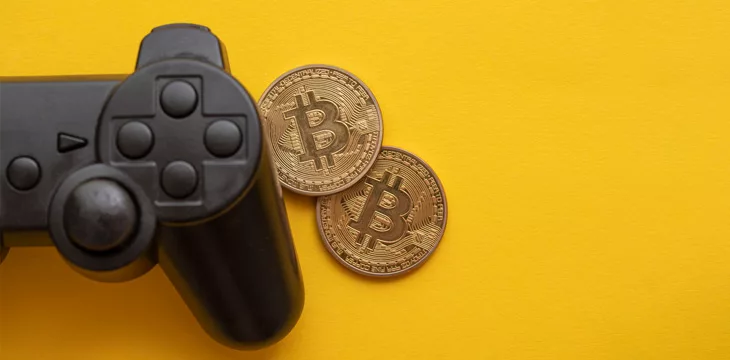|
Getting your Trinity Audio player ready...
|
The latest episode of CoinGeek Discussions on X focused on gaming within the BSV blockchain. Joining hosts Alex Vidal and Zachary Weiner were representatives for Lil Bit, a BSV blockchain-based online casino and sportsbook, and CoOM Battles, a trading card game. The Emperor of Bitcoin, Daniel Krawisz, also joined the conversation.
CoOM Battles—Tournaments are marketing
Brett Banfe tells us a little about the game CoOM Battles. He notes its success, stating that tournaments are marketing, and they’ve generated lots of interest so far. People love and put a lot of effort into gaming, he says, but so far, it has always been players paying creators. Games like CoOM Battles change that, allowing players to earn from their efforts. He advises other people building games to use tournaments as a way to attract new players.
Weiner says that, while they are an effective marketing tool, the tournaments are more than that. So far, they’ve been highly competitive, giving players a real challenge.
ChampionsTCG says that CoOM Battles was created mostly because the opportunity was there. It’s different because there’s nothing like it on Bitcoin yet, and he genuinely believes it can compete with games like Hearthstone, which has 100 million active monthly players. In those games, players can’t actively trade cards on the market, which is another differentiator for CoOM Battles.
CoOM Battles is currently integrated with HandCash and the Ordinals wallet. Some 10,000 cards were issued on the BSV blockchain, with another 30,000 on BTC. HandCash made minting packs of cards possible, whereas they had to be issued one by one on BTC. The whole process was just easier and more efficient on the BSV blockchain, ChampionsTCG says, but the cards were popular on both chains.
Lil Bit—An online casino and sportsbook on BSV blockchain
User Lil Bit explains that he got into Bitcoin in 2013. It immediately blew his mind, and back then, there were endless apps being developed and released. He initially thought of using it for remittances, but he slowly became disillusioned after the block size wars and the limiting actions of BTC Core developers.
Back in those days, there was a popular Plinko game that generated millions of transactions on Bitcoin. However, it was ruined by the transaction fees that accompanied the attack on Bitcoin by BTC Core. That said, after attending the CoinGeek Conference in Toronto in 2019, he decided to rebuild this popular game as well as a sportsbook and a wider casino.
“Most people today don’t understand what Bitcoin is,” he says. He hopes to change that by demonstrating the power of micropayments via his app.
Lil Bit is fully licensed in several jurisdictions but not in the U.S. yet. Soon, it will be offering bonuses for its Plinko game, and it has a generous referral program where affiliates can earn 1% of all revenue generated by the players they refer.
Daniel Krawisz, an OG Bitcoiner, is impressed with Lil Bit. He remembers the days when people could use it for micropayments, and he hopes the app has success.
CryptoVoyager suggests that the two games could work in partnership: Lil Bit could offer the opportunity to bet on CoOM Battle tournaments. Both like this idea and agree to look closer at it.
Lil Bit solves several fundamental problems with online sportsbooks and casinos today: the app will never take custody of the players’ funds (they’ll stay in their wallet), so payouts will not be an issue. Additionally, BSV blockchain transaction IDs will be used to generate game results, so it’s a provably fair outcome. As for sportsbook odds, they’ll be provided by a third-party provider.
One participant asks what the minimum withdrawal is. Again, Lil Bit explains that the app will never have custody of customer funds. Since the BSV blockchain has tiny fees and fast transactions, every bet will be settled to and from the user’s wallet in real time.
How will Lil Bit compete with FanDuel and other established sportsbooks? The company is betting that the BSV blockchain will catch on, and as the network grows, so will the popularity of the app. Not taking custody of player funds will appeal to players, and the 1% referral system is a huge advantage, too.
Could locking coins up be a costly signal to demonstrate commitment to the network?
Krawisz answers this question first, stating that holding coins is part of the process of using them (buy-hold-spend) but that locking them up as a signal is unnecessary. While doing so is an opportunity cost, it’s somewhat speculative and subjective. Burning energy (proof-of-work mining) is more objective.
Greg Ward weighs in on this issue, saying that he finds the idea of locking up coins as a peacock feather interesting. However, resisting the urge to spend available coins arguably demonstrates a greater commitment to the network’s long-term viability. In his view, dedicating your time and energy to building on the blockchain is the strongest signal of all.
Garrett Krause shares more about TroyMoney
User ‘Ferdinand’ asks what the smallest denominations will be when using TroyGold. Krause answers that you’ll be able to buy and spend grams of gold; the idea is to use gold as money and spend it on everyday items like coffee.
Furthermore, TroyMoney is working on tokenizing things like real estate and other assets over the next ten years. Krause points out that this is a $30 trillion industry, and only the BSV blockchain can offer the seamless, low-fee transactions required to make it work at scale.
What will the costs be for the merchants? Krause says something like the BSV blockchain network fee plus a quarter point. It will work out much cheaper than current card processing fees. Merchants will also play a vital role in getting people to use TroyMoney.
Watch: Exploring micropayments for ‘Remittance Revolution’ at The Bitcoin Masterclasses #6

 07-04-2025
07-04-2025 





